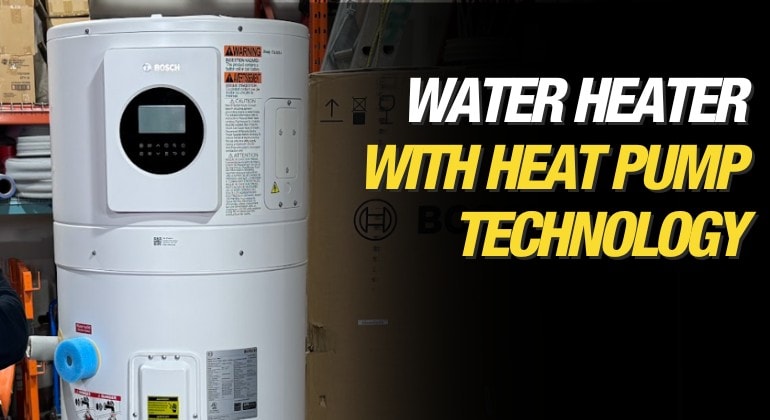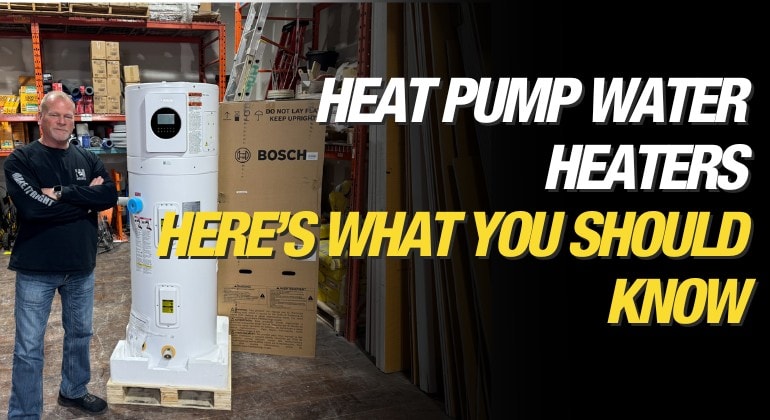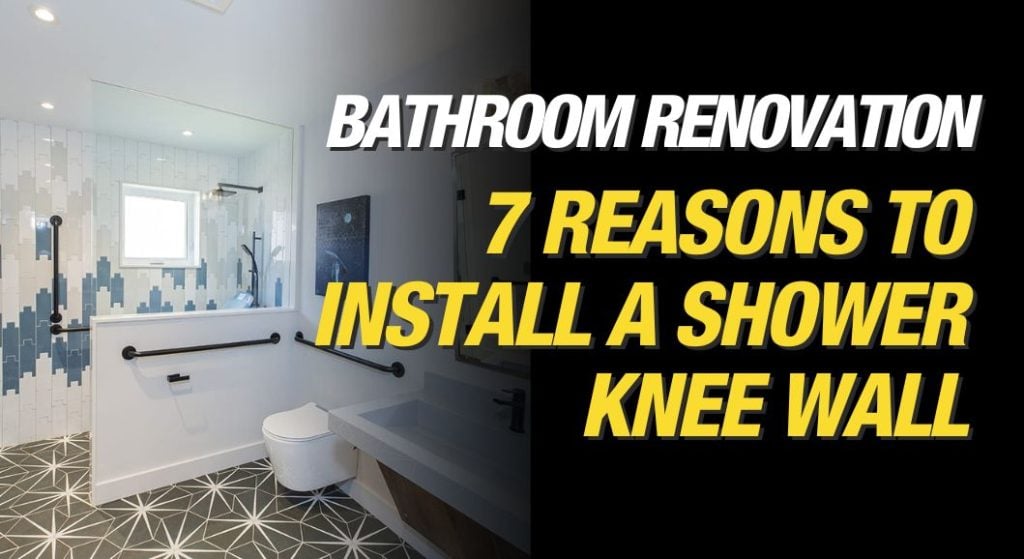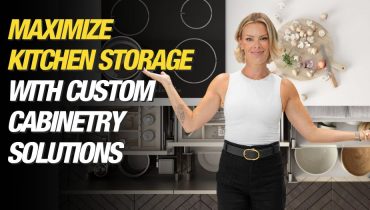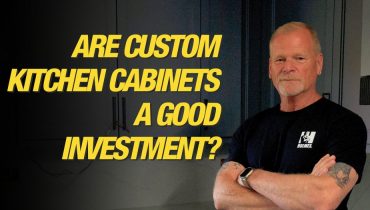Dream of a career where your skills bring joy, enable freedom, and create unforgettable memories? The thriving recreational vehicle (RV) industry offers just that! It’s more than fixing vehicles; it’s...
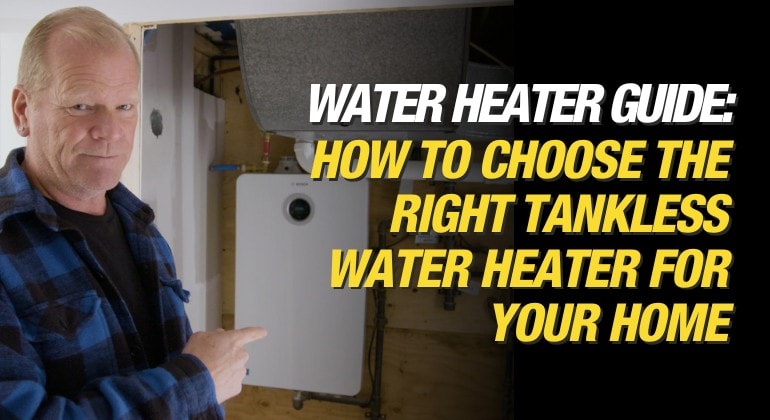
How to Choose the Right Tankless Water Heater for Your Home
By Mike Holmes
Mike’s Advice / Home Renovation
Tuesday, September 5th, 2023 @ 4:23pm
Tankless Water Heater Guide
If you have a good tank water heater but are looking for a unit that could offer you better energy efficiency, you may want to look at a tankless model. Also, if your tank water heater is showing its age, a tankless water heater may be a good upgrade. Tankless water heaters can also supplement an extension if you are planning a legal income property. They have been around for ages, but with new high-efficiency models, they can be a great choice for your home. Here’s why.
What Is A Tankless Water Heater?
A tankless water heater, also known as an on-demand water heater, provides instantaneous hot water without the use of a storage tank. It warms water as it travels through the device, providing energy efficiency and a steady supply of hot water.
Tankless water heaters are compact and provide hot water on demand, without the need for a large tank full of water, like traditional water tank heaters. They’re efficient and can run on electricity, natural gas, or propane.
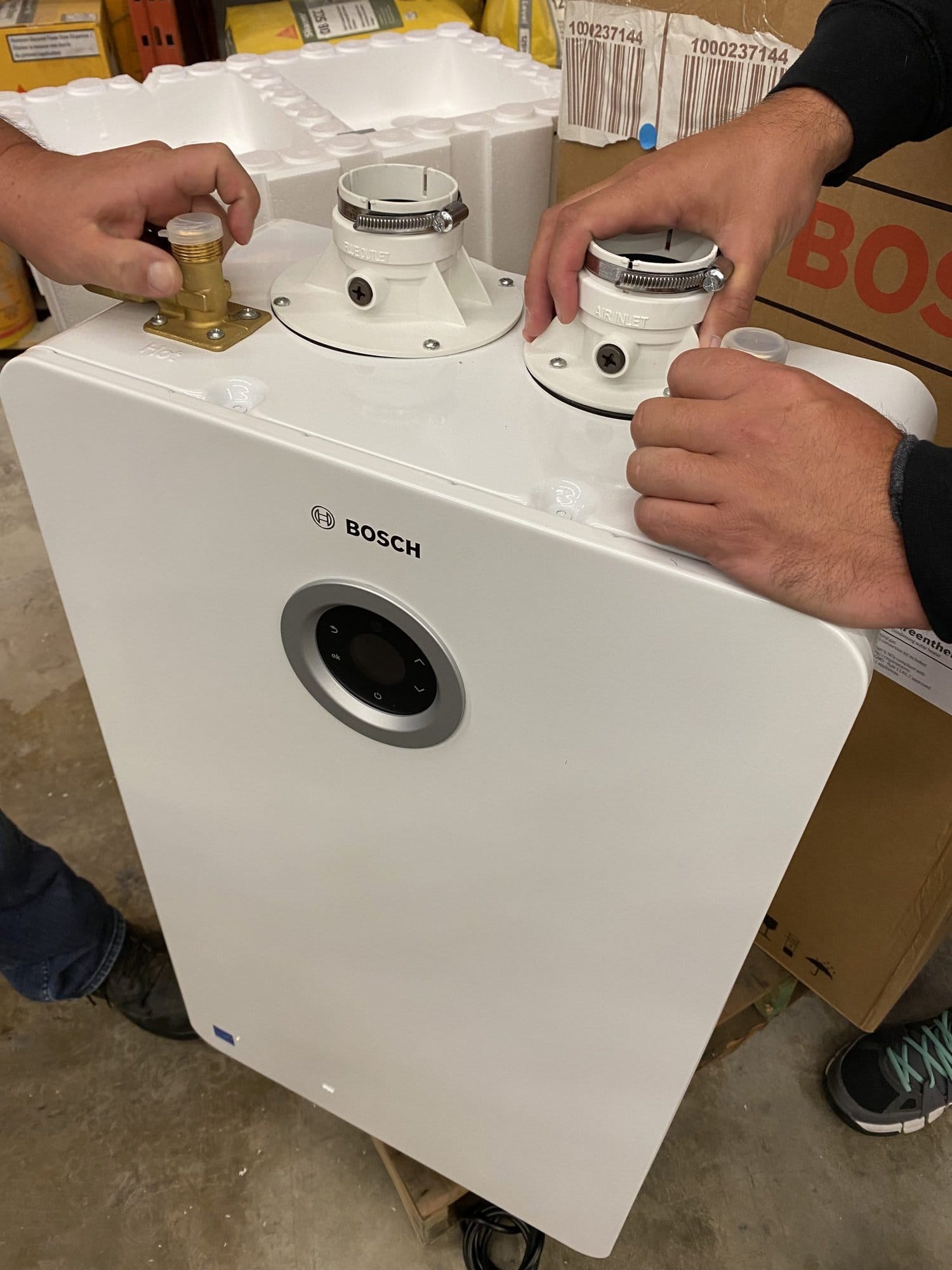
We installed the Bosch Greentherm 9000 Tankless Water Heater on our projects.
They are typically wall-mounted and can be installed closer to the source (bathroom, for example, if you have just one in your home), using less piping and reducing the time for hot water to reach the faucet or shower. This means faster hot water and reduced water waste. It also makes them great for small spaces.
Fuel Types of Tankless Water Heaters
Tankless water heaters can be powered by electricity, natural gas, or propane. However, the most common power sources are electricity or natural gas.
Electric tankless water heaters
Advantages of Electric Tankless Water Heater
- Energy-efficient
- Easy installation
- No venting is required.
Disadvantages of Electric Tankless Water Heater
- Limited flow rate
- High electricity consumption
- May require electrical upgrades
Gas tankless water heaters
Advantages of Gas Tankless Water Heater
- High flow rate
- Cost-effective for large households
- Lower energy costs

This is a Bosch Gas Tankless Water Heater installed on one of our projects.
Disadvantages of Gas Tankless Water Heater
- Requires venting.
- Higher upfront cost
- Requires gas or propane supply
High-end tankless water heaters’ higher initial cost is their biggest drawback and will cost more than a conventional storage tank unit; however, the difference will be offset over time by the reduction in energy expenses.
RELATED:
Importance Of Choosing The Right Tankless Water Heater
It’s important to choose the right water heater for your home because an inadequately sized unit won’t provide enough hot water for your needs. On the other hand, an excessively large-sized unit will cost you more and is a waste.
The real question is how much hot water do you need during peak periods? I’m talking about when you have the dishwasher running, a load of laundry going, and your teenager is taking unlimited showers.
A professional can help you determine the best size unit for your home based on your needs, consumption, and size of your home.
Find a Bosch Trained and Certified Technician here.
Factors to Consider When Choosing the Right Tankless Water Heater
There are many factors to consider when picking a tankless water heater, including:
- The size of your property
- Amount of water used
- The flow rate of your taps
- The temperature of the water before it heats up
- How hot do you want your water to be
Additionally, you want it to be simple to maintain and energy efficient. You should also budget for licensed and professional installation.
Household Water Demand
Determining the peak hot water usage is a key element when determining what size of tankless water heater you need. For example, early mornings when everyone in your family is having a shower, or in the evening when the dishwasher, laundry and bath time for the kids is happening.
The number of appliances and fixtures requiring hot water should be considered as well as the flow rate.
Size and Capacity
To help you determine the right size and capacity tankless water heater, I would always consult with a professional when doing your research. However, here is a good estimate:
- 3.5 GPM is great if you are planning on using 1 or 2 fixtures simultaneously – good for a single or couples.
- 5 GPM is great for larger families, using 2 to 3 fixtures simultaneously.
- 7 GPM is the best bet for large busy families when using 3 to 4 fixtures at the same time.
When sizing a tankless water heater, two things must be considered:
- Gallons Per Minute: How much hot water will you require at any given time?
- Temperature Rise: the variation in temperature between the intended temperature and the cold-water temperature entering the system.
Energy Efficiency
Lucky for us, most new appliances have energy efficiency top of mind. To be on the safe side, however, make sure to look for ENERGY STAR certified appliances and check the energy factor (EF) rating.
The energy factor (EF) is based on the quantity of hot water produced per unit of fuel consumed over a normal day and is used to calculate a water heater’s energy efficiency. Typically, the more efficient the water heater, the greater the energy factor.
Installation Requirements
Anywhere in your house is an excellent place to install a tankless water heater. Even a bathroom can have a tankless water heater – popular in Europe. For instance, some families with larger homes decide to install two, one for each level. Because of their compact size, they may be stored in pantries, closets, cupboards, and laundry rooms.
Gas units require a gas line, adequate combustion air, a vent to remove combustion gas, and an electrical outlet to power the unit.
Electric tankless water heaters will require a dedicated circuit and it may also need an upgraded power line to your home. An electric tankless water heater may save you some money, but you also need to consider your total hook-up costs, including an electrical service upgrade.
According to the National Electric Code (NEC), a circuit breaker should only handle 80% of its total capacity. So, an 80-amp breaker should be used for a 100-amp tankless water heater.
Cost
It’s always good to do a cost comparison of different models, including upfront costs like installation and possible mechanical upgrades, as well as long-term costs like energy savings, regular maintenance and potential repair costs before making your final decision. You should also perhaps consider how long you plan to stay in your home.
The Greentherm 9000 line from Bosch comes with seven models to ensure a configuration for any need from small homes or condos to large commercial applications. Indoor models can be converted from natural gas (NG) to liquid propane (LPG), and flexible venting options keep installation simple.
RELATED:
Government Tax Rebates
Many of the energy-efficient appliances and mechanical upgrades are a significant investment for homeowners. However, most governments and provinces offer incentives with rebates. For example, Ontarians can save up to 25 percent per item (up to $500) except for tankless condensing water heaters and ductless mini-split indoor units (air-source heat pumps), for which rebates can be up to $1,000 per item. Energy Star-certified tank water heaters have a $250 rebate.
Always check with your local energy authority and work with your installer to find out what is available in your area.
Advantages of Tankless Water Heaters
Tankless water heaters have been around for a while and are hugely popular in Europe. They provide endless hot water when you need it, use less energy, and take up less space. They also last longer than traditional water heaters and have low maintenance costs.
Endless Hot Water Supply
An endless supply of hot water is essential for busy households with higher water demands than traditional water heaters. This is especially true when it’s an everyday occurrence to have several fixtures being used at the same time!
We’ve been adding tankless water heaters in all our home renovations, as they are a practical option for today’s busy homes.
Energy Efficiency and Cost Savings
Because tankless water heaters provide hot water on-demand, there is no standby heat loss like traditional heaters. Plus, they will also save you money on your utility bills as you aren’t heating unused water. For busy households, I think they are a great alternative to traditional water heaters.
We’ve been installing the Bosch Greentherm 9000 in some of our projects, because it offers an efficiency rating of UEF of 95% and innovative features for easy installation, operation and simple maintenance. It also has an industry-leading 15-year warranty on the heat exchanger and a full 5-year limited warranty on parts.
Plus, the free Greentherm 9000 mobile app allows you to remotely control the water temp, activate the recirculation pump, and monitor usage and sensor values from your cell phone or tablet.
Space-Saving Design
The other great thing about tankless water heaters is that they are wall-mounted and take up much less space than traditional water heaters. This makes it ideal for smaller homes or apartments, or a great supplement to additions or upgrades. The units can even be placed in closets or tucked away neatly in the wall behind an access panel.
All Greentherm 9000 Series models feature sleek, rounded corners on the metal cabinet, making these water heaters as beautiful as they are energy-efficient. The premium Greentherm 9900i SE model comes standard with a glass front and integrated Wi-Fi control (available as an option on other models).
Longer Lifespan
Tankless water heaters typically have a longer life cycle than traditional water heaters and are less susceptible to corrosion and leaks.
Reduced Risk of Water Damage or Leaks
Tankless water heaters don’t have large storage tanks filled with water that can burst or leak. This in turn minimizes the risks of water damage and associated costs.
RELATED:
Disadvantages of Tankless Water Heaters
As much as I love tankless water heaters, there is a premium price tag. Generally, they are more expensive to purchase and install. And while they heat water on demand, the tankless water heater’s output is limited by the flow rate.
That’s why you need to work with an HVAC specialist who also has brand-specific training. Many high-end brands, like Bosch, provide additional training and certification to ensure the consumer gets the best experience and performance from their units.
It’s another good reason to do your research before making your purchase.
Higher Upfront Costs
Tankless water heaters are generally more expensive than traditional water tanks. They average between $1,000 to $3,000 per unit, while tank models range from $300 to $2,000.
Don’t forget installing a water tank is NOT a DIY project. You’ll need a professionally trained technician, and likely a licensed plumber and electrician to complete the work. You may also need a gas fitter depending on the power source of the unit.
DID YOU KNOW
The Ontario gas regulations require that a licensed gas technician do any new connection of a gas-fired appliance. So if you’re in Ontario, you must have an Ontario LICENSED gas technician do the installation.
Limited Flow Rate
You may be running your tankless water heater to its limits, if you are experiencing cold water when you are running the dishwasher, doing laundry, and someone showering all at the same time.
Every model of tankless has a flow rate capacity. However, you may also not have the right unit for your needs, or you may need to get a dedicated one for your laundry room or additional bathroom.
Typically, tankless water heaters can produce 2 to 5 gallons (7.6 to 15.2 liters) of hot water per minute. Gas-powered tankless water heaters typically have higher flow rates than those powered by electricity. However, there are times when even the largest gas-fired model is unable to provide enough hot water for numerous simultaneous usages in large houses.
Additional Electrical or Gas Infrastructure
Before making your final decision on your tankless water heater, you’ll need to make sure your electrical system can handle the new appliance. Most tankless water heaters can use either 110 or 220 volts, depending on the model.
All electric tankless water heaters operate on a 240-volt dedicated circuit that solely powers the water heater and no other appliances or devices. Electrical water heaters do not require venting.
To find a Licensed Electrical Contractor go to the Electrical Safety Authority.
However, gas-powered tankless water heaters do require proper venting with 4” piping. Tankless water heaters can be vented in one of two ways: power-vent or direct-vent. Power-vent appliances simply vent the exhaust outside while using interior air for burning. Direct-vent systems feature two vents for intake and exhaust since they draw air in from the outside.
Possible Temperature Fluctuations
As mentioned previously, inconsistent water temperature is typically caused by the inability of your tank to meet your needs. If your unit is struggling to meet the demand or to reach the “set-point” of the unit – it is recommended to change to a higher “set-point” at the water heater and mix more cold water at the outlet (though, it shouldn’t exceed 120 F/ 48.8 C).
However, an improperly sized unit can also cause temperature issues, as well as issues with the heating elements, valves or sensors.
When multiple outlets are used with changing flow rates, the unit sometimes cannot react fast enough, from an exchanger delay. The best solution for this is to have a tankless water heater that has a bypass valve to overcome the fluctuations.
DID YOU KNOW?
According to the Ontario Building Code, every dwelling must have an adequate hot water supply with a temperature range from 45°C to 60°C, and all-electric storage-type service water heaters shall have a minimum set storage temperature of 60°C.
Regular Maintenance and Tankless Water Heater Descaling
If you are thinking of getting a tankless water heater installed, you really should get your water tested first. I have hard water and I’m on a well system and it was brutal on my pipes and mechanics.
Scale buildup in your drains and pipes, shower head aerators, and faucets, can be particularly bad when your water is hard. Iron pipes are susceptible to rust and silt, and hard water causes calcium and magnesium build-up. This build-up can lead to poor water flow which can affect water pressure and temperature.
If that happens regular descaling becomes crucial to ensure consistent performance and longevity. I ended up having a whole home water filtration system installed in my home.
RELATED:
How to improve your home’s water quality?
What is the best home water filtration system?
How do you know if you have hard water and how do you improve your water quality?
The Best Tankless Water Heater
One of the best tankless water heaters I’ve used is the Bosch Greentherm 9000. We’ve installed it on several of our projects.
The Bosch Greentherm tankless water heater is well-known for its energy efficiency and small design, which allows it to provide on-demand hot water while consuming minimal electricity.

A Bosch Greentherm 9000 has many benefits for homeowners and contractors.
Here are some of its great benefits:
- Space-saving, state-of-the-art tankless design
- Ultra-efficient condensing technology with UEF up to 0.95
- Wi-Fi accessory & App increases functionality
- Top water connections for easy tank replacement
- Industry-leading 15-year warranty on the heat exchanger and a full 5-year limited warranty on parts
Maintenance Requirements
Generally, tankless water heaters should be serviced at least once every year. Lime and calcium deposits can build up inside the tankless system. If you have hard water, it’s good to descale and flush it every six to nine months. For households with soft water or a water softener system, this maintenance can be performed every 3-5 years.
The Bosch Greentherm 9000 series indoor models were specifically designed with top connections for water, integrated drain ports so isolation valves are not needed, and a unique integrated sensor technology that auto-calibrates, making the switch to tankless water heating quick and easy.
Pro Tip:
Small tune-ups can make a huge difference in avoiding major, expensive repairs in the future.
Hiring A Professional for Installation
Tankless water heaters require electricity and or gas lines, extremely hot water, and pressure-controlled tanks. Don’t take chances with these complex systems. Water heater installation (tankless or tanked) must be done by a qualified professional to ensure your unit performs optimally and safely – not to mention the warranties that are included using high-quality units and professional installers.
To find a Bosch Trained and Certified Technician go to: https://www.bosch-home.ca/en/service/book-a-service
In the end, I think a tankless water heater is a good choice especially if you are in your forever home, looking for a high-efficiency upgrade or need to supplement your hot water demand. They provide endless hot water when you need it, use less energy, take up less space, last longer than traditional water heaters, and are low maintenance. Do your research, and work with a licensed brand-certified professional. A proper installation will ensure your home will have consistent water temperature, safety, warranties, and peace of mind.
QUESTIONS:
Are tankless water heaters cost-effective?
Tankless water heaters can save money in the long run since they only heat water when it is needed, eliminating standby heat loss. While their initial costs are higher, the potential for decreased energy bills more than compensates for this initial investment.

This tankless water heater we just got for our new project is from Bosch Home Comfort and is more efficient than a traditional tankless water heater because it only heats water when needed.
How long do tankless water heaters typically last?
Tankless water heaters often outlive traditional tank heaters due to their durable design and minimal exposure to corrosion-inducing standing water. Regular maintenance might help to extend their life even more.
Can I install a water heater myself?
While self-installation of a water heater may be appealing for people with technical expertise, hiring a licensed professional is the better option to ensure a safe and code-compliant installation that eliminates possible dangers.
Can a tankless water heater be too big?
Choosing a tankless water heater that is too large for your needs might result in excessive energy usage and upfront expenditures. It is critical to precisely analyze your hot water needs in order to select a suitably sized unit for maximum efficiency.
READ NEXT:
How To Choose An HVAC System For Your Home

